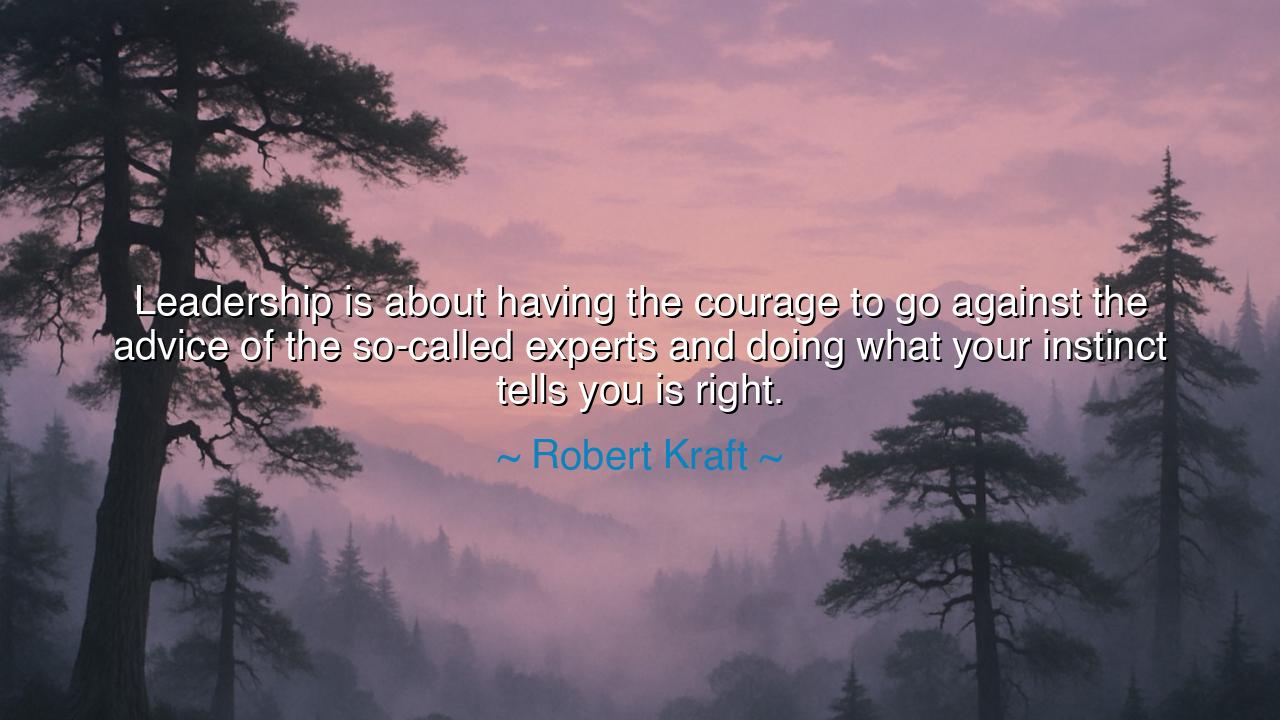
Leadership is about having the courage to go against the advice
Leadership is about having the courage to go against the advice of the so-called experts and doing what your instinct tells you is right.






“Leadership is about having the courage to go against the advice of the so-called experts and doing what your instinct tells you is right.” Thus spoke Robert Kraft, the visionary businessman and owner of the New England Patriots, a man who built his legacy not by following the crowd, but by trusting the compass within his own soul. His words ring with the strength of conviction and the wisdom of experience. They remind us that leadership is not the art of pleasing others, but the sacred duty of following truth—even when that truth stands alone.
In every age, the world has been filled with “experts”—voices of reason, authority, and experience. Yet reason, though noble, is not infallible; and experience, though valuable, can be bound by convention. The leader must listen, but not be ruled; must consider counsel, yet remain guided by conscience. Courage is the element that separates true leaders from mere administrators—the courage to trust one’s instinct, that quiet voice that whispers where logic hesitates. For instinct, when purified by wisdom and integrity, is often the instrument through which destiny speaks.
Kraft himself lived this truth. When he purchased the Patriots in 1994, many “experts” warned him that the team was a poor investment—a failing franchise with a bleak future. Yet Kraft saw what others could not. He trusted his intuition, his belief that football was not merely sport but culture, a unifying force for community and spirit. He went against the counsel of the cautious and followed what he knew in his heart to be right. In time, his decision transformed the Patriots into one of the most successful teams in sports history. Thus, his quote was not born from theory but from fire—from experience, risk, and triumph.
The ancients understood this power of inner guidance. The philosopher Socrates, standing before the court that condemned him, refused to recant his teachings, saying that his conscience—the “daimon” within him—was his truest guide. The generals of Greece called him foolish; the citizens called him dangerous. Yet history calls him wise. In choosing to obey his instinct for truth over the clamor of authority, he became immortal. So too does every great leader walk this narrow path, hearing the voice of their own integrity above the noise of the world.
To lead is to bear loneliness. For when one defies the experts, one risks ridicule and failure. Yet the leader of courage knows that the greater failure is to betray one’s own vision. The river does not ask the mountain for permission to carve its path—it flows where it must, and in time, the world shapes itself around its course. So it is with the leader whose instinct aligns with purpose: the world may resist at first, but ultimately, it yields to the strength of unwavering conviction.
The lesson, then, is not that one should scorn advice, but that one must have the wisdom to discern which voices serve truth and which serve fear. Listen to counsel, but weigh it against the quiet knowledge of your heart. The greatest leaders are not rebels without cause; they are seekers of what is right, even when the path is uncertain. Their courage lies not in defiance alone, but in faith—that what is right will reveal itself through action, not approval.
To live by this wisdom, practice courageous discernment. When faced with a decision, gather all knowledge you can—but do not let it drown your intuition. Ask yourself: does this choice align with my deepest values, or with the comfort of the crowd? When fear whispers caution and instinct whispers purpose, choose purpose. For leadership is not measured by safety, but by impact; not by popularity, but by the quiet knowing that one has done what is right.
So remember Robert Kraft’s teaching. The world will always have its experts, its voices of doubt, its prophets of caution. Yet true leaders must sometimes walk alone, guided not by the approval of others, but by the integrity of their own soul. For only those who dare to trust their inner compass can discover new worlds—and only those who have the courage to act upon it can lead others there.






AAdministratorAdministrator
Welcome, honored guests. Please leave a comment, we will respond soon